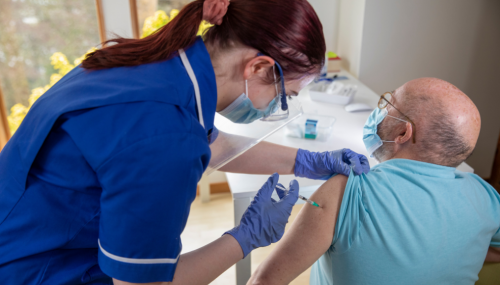- Our studies
- Our research
- Publications and resources
- Data access and training
- About
- News
- Events
- Get in touch
- Join our mailing list

Researchers can now access new information about how the COVID-19 pandemic impacted the lives of almost 28,000 cohort study participants during the third national lockdown in February and March.
This newly released data comes from Wave 3 of the COVID-19 Survey in Five National Longitudinal Studies. Together with the information gathered during the first two waves of survey data collection, researchers now have access to data about the experiences of more than 34,000 individuals during the coronavirus crisis.
This new Wave 3 information will help researchers understand how people’s lives have changed since the earlier two surveys, which took place in May 2020 (Wave 1) and then during September and October (Wave 2). The data collected from participants, aged between 19 and 74 at the time of Wave 1, provides important insights into the economic, health and social consequences of the coronavirus outbreak.
The latest survey closely mirrored the topics covered in Waves 1 and 2. However, new questions were included to reflect the evolving crisis, on subjects such as the vaccination programme and long COVID. In addition, as in Wave 1, participants were asked to share, in their own words, how the pandemic had affected them and their loved ones, providing an opportunity for qualitative research.
Around 5,000 new participants completed the survey in Wave 3, in addition to the 23,000 participants who also took part in one or both of the previous two waves.
The survey was sent to participants in all four national longitudinal cohort studies run by the UCL Centre for Longitudinal Studies (CLS) as well as participants in the MRC National Survey of Health and Development, run by the MRC Unit for Lifelong Health and Ageing (LHA), also based at UCL. The five studies included are:
These studies have been following large, representative cohorts since birth, gathering information about different aspects of participants’ lives, at different stages of their lives. Researchers will be able to analyse these new Wave 3 COVID-19 survey data in conjunction with data from Waves 1 and 2 of the survey, as well as the longitudinal data collected over the lifetime of each study.
Professor Alissa Goodman said: “Since first contacting our study participants in May 2020, more than 34,000 people from across four generations have shared their insights into how the coronavirus outbreak has affected their livelihoods, their families and relationships and their physical and mental health.
“With each new wave of the survey, we’ve seen the numbers of respondents increase, helping us to build a more representative, accurate picture of how the COVID-19 crisis has impacted the whole of society. Using the information we’ve gathered from these three waves with other study data, collected across more than 70 years, researchers will be able to examine how prior life experiences shape resilience or vulnerability to the effects of the pandemic both in the short term, and much further into the future.”
Find out more about the data
For more information about the design and content of the survey, the response, data collected and weights, see the CLS website COVID-19 survey page. The questionnaire and user guide are both available to download.
A CLS webinar on Thursday 17 June will give researchers an overview of the three waves of the survey, focusing on content, how to deal with non-response and research findings. For more details and to register, see the CLS website.
Access the data
The online survey data from Waves 1, 2 and 3 from the four CLS studies taking part, namely the MCS, Next Steps, BCS70 and NCDS, have been de-identified and are available for researchers to download under End User Licence from the UK Data Service:
To download the data (SN: 8658), visit the UK Data Service website.
The data are also available from each of the main pages for the four studies on the UK Data Service website:
National Child Development Study
Weights have been provided with this COVID-19 dataset to take account of non-response to the survey, in order to help researchers produce representative results.
See the user guide to the data for more information.
Wave 1 and Wave 2 data from the MRC National Survey of Health and Development is available from the UK Data Service under Special Licence Access. Wave 3 data will be available from the UK Data Service shortly, and in the interim researchers can submit an application to the study to access the Wave 3 data.
Notes:
Ryan Bradshaw
Senior Communications Officer
Phone: 020 7612 6516
Email: r.bradshaw@ucl.ac.uk